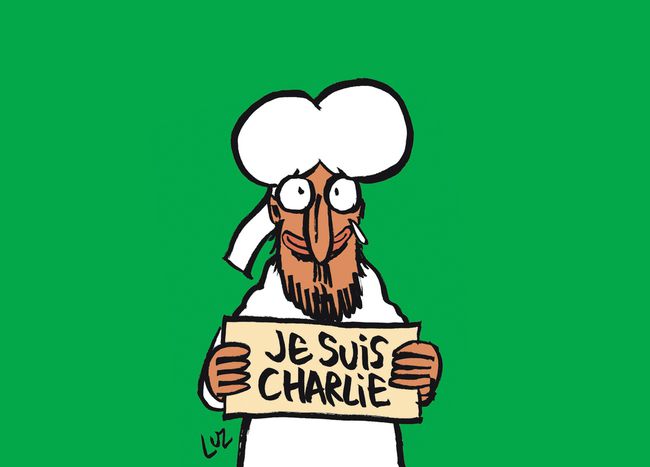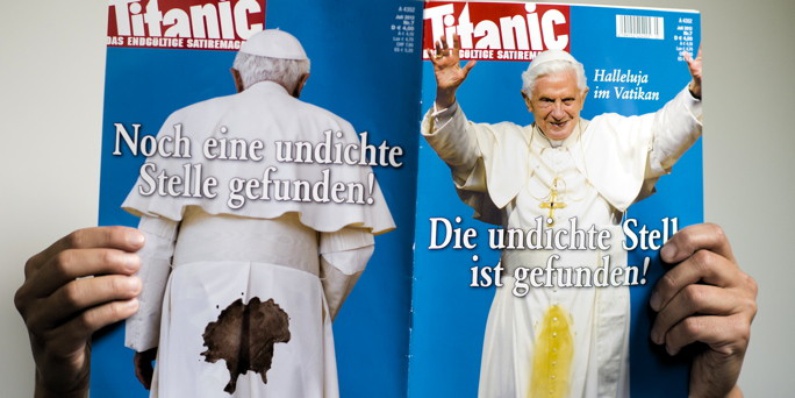
In the World of Charlie
Published on
Translation by:
Una DimitrijevicEven though most of our fellow citizens and our political leaders are calling for vigilance, it would be nice to partake in the prettiness conveyed by the demonstrations in support of Charlie Hebdo last weekend. Welcome to the the world of Charlie, where everything is pretty.
'Amalgamation', 'fears', 'political recovery'… Shortly after the demonstrations in support of Charlie Hebdo and of the freedom of expression last weekend, these kinds of key phrases became a basis for most editorials and political statements in the French press. In the streets: a very different mood. On Sunday January 11th, during the Republican rally organised in Paris, the 2 million people gathered for the occasion chanted much more unifying slogans, going as far as expressing their thanks to the police.
Something never-before-seen in the life of a young demonstrator. To witness people embracing members of the CRS (the state security police), flags merging those of Israel and Palestine, about fifty Heads of States arm-in-arm; it was enough to project an even better picture of a unified world than that which Paris was able to give us for a few brief hours. To imagine a world where everyone is beautiful, where everyone is friendly. Or simply to imagine that we can take advantage of this unprecedented public momentum created by sheer outrage, in order to call out certain governments which still uphold repressive laws.
I am Well, Je suis Charlie
In the world of Charlie, the Spanish government would immediately withdraw its new legislative project for 'citizen safety'. Adopted by the Council of Ministers on November 29th, the 'ley de Seguritad Ciudadana' envisages, among other things, a ban on satirical drawings parodying politicians, and a fine of 30,000 euros for any smart Aleck with the audacity to organise an undeclared demonstration.
In the world of Charlie, Turkish opposition papers such as Cumhuriyet — which reprinted four pages of Charlie Hebdo's latest edition — could publish without having to be the subject of police persecution. On the night of January 13th-14th 2015, the police conducted a raid of Cumhuriyet’s printing shop to examine the contents of the newspaper and to telephone a prosecutor before authorising its circulation (only partial, as it turns out). On the Web, four sites had to censure their content following the decision of a court in the South East of the country. In the name of what? Of an interpretation of justice which judges that Charlie’s drawings are “an insult to believers ”.
Orban and Erdogan were present during the republican march of Sunday January 11th.
In the world of Charlie, a satirical Hungarian weekly paper could clearly publish on its front page the Pope brandishing a condom with the title: 'This is my body', as conjured up by this Hungarian journalist. All this without the government of Viktor Orban - obsessed by the rewriting of the Constitution - being able to wield the Hungarian civil code which can easily result in a person being sentenced because of a simple joke.
In the world of Charlie, Russia could not yield to the siren calls of the Church and as a result promulgate a law which establishes the crime of blasphemy. Ratified in 2011, the text condemns whosoever “expresses a disrespect with regards to society, with the aim of offending the religious feelings of believers”, with resulting fines of up to 11,500 euros. Then while we're at it, in the world of Charlie, a person could show their support for Charlie and not be arrested in a public square for holding up a sign.
Everyone’s Ungodly
As it has been made quite clear, in the world of Charlie, everyone is beautiful, everyone ungodly. In other words, in the world of Charlie, anti-blasphemy laws would be nailed to the pillory. These very laws are in force in 8 EU Member States including Denmark, Poland, Germany, Greece… but they are rarely applied, and have even fallen into disuse. In the world of Charlie, why not repeal them? In Germany for example, the last precedent goes back to 2012, when the satirical magazine Titanic showed the pope soiling himself on its front page. After stepping up to the plate under the terms of the anti-blasphemy paragraph 166 of the Grundgesetz (which more or less stands in for a Constitution — Ed.), the Holy Father withdrew his complaint when the Sonneborn newspaper threatened to take the case to court. End of story.
 The problem it is that throughout a large part of the Middle East and North Africa, legal texts still criminalise blasphemy and apostasy. Over there, the irreligious are, in the best case scenario, punished by whipping. However, over there, there are also women and men who defend their own freedom to offend. Just as well. Because in this kind of world, in the world of Charlie, the more crazy people that there are, the more that we are merry.
The problem it is that throughout a large part of the Middle East and North Africa, legal texts still criminalise blasphemy and apostasy. Over there, the irreligious are, in the best case scenario, punished by whipping. However, over there, there are also women and men who defend their own freedom to offend. Just as well. Because in this kind of world, in the world of Charlie, the more crazy people that there are, the more that we are merry.
Translated from Dans le monde de Charlie, tout le monde il est gentil



